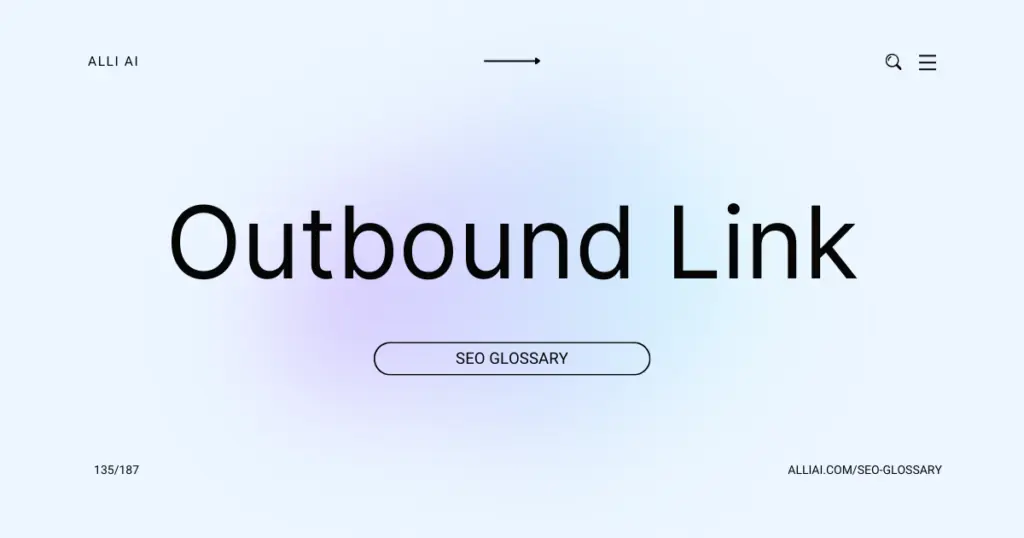What Does Outbound Link Mean?
An outbound link is a link from one website to a different website. This link takes visitors from your site to another site on the internet.
Where Does Outbound Link Fit Into The Broader SEO Landscape?
Outbound links, or external links, are links from a given website to other external domains. In the broader SEO landscape, they play several roles:
1. Relevance and Quality Signal: Outbound links to authoritative and relevant sites can enhance the credibility of your site. Search engines like Google consider this a “trustworthy” signal, indicating that your content is backed up by reputable sources.
2. User Experience: Outbound links can provide additional context or reference that enhances user understanding and satisfaction, which are important metrics for ranking algorithms.
3. Networking and Relationships: By linking out to other sites, you facilitate a network of backlinks and potential relationships, which can result in reciprocal links or shared opportunities.
4. Enhancing Content Value: Providing users with direct links to learn more, verify facts, or dive deeper into topics can make the content more valuable and, by extension, more shareable.
5. SEO Partnerships: In some cases, crafting deliberate outbound linking strategies can lead to formal partnerships where websites agree to support each other’s content efforts.
In summary, outbound links contribute to the SEO ecosystem by emphasizing quality, enhancing user engagement, and fostering web relationships, which are integral to web ranking algorithms.
Real Life Analogies or Metaphors to Explain Outbound Link
1. Outbound links are like references in a research paper. Just as a researcher cites other scholarly works to add credibility and context to their work, a webpage includes outbound links to offer additional depth, backing, or proof of their content’s validity.
2. Think of outbound links as doors leading out of a house into the broader neighborhood. These doors allow visitors to explore further, discovering related or useful information elsewhere, enriching their overall understanding of the topic at hand.
3. Outbound links as tour guides in a museum. They point visitors to other related artworks or exhibits, enhancing their overall educational journey and understanding of a particular subject or theme.
4. Outbound links as bridges. Just as a bridge connects two separate locations, an outbound link connects your webpage to other relevant areas of the internet, facilitating the flow of information between them.
5. Outbound links as invitations. Sending out an invitation to a party, you’re suggesting to your guests that there’s something worth attending or checking out elsewhere, just as an outbound link suggests other websites or pages worth visiting.
How the Outbound Link Functions or is Implemented?
1. Identify the Destination URL: Decide the webpage to which you want to link.
2. Anchor Text Selection: Choose the text within your content that will be clickable and lead to the external site.
3. HTML Code Implementation: Insert the HTML anchor tag around the chosen anchor text. The basic syntax is `Anchor Text`. Replace `”URL”` with the actual URL you are linking to.
4. Set the `target` Attribute (Optional): By default, when a user clicks on the link, it will open in the current window. If you want it to open in a new window or tab, add `target=”_blank”` to the anchor tag, e.g., `Anchor Text`.
5. Add `rel` Attribute (Optional): For controlling link identification by search engines, use `rel=”nofollow”` if you do not want to pass link equity to the destination site. To mark the link as sponsored, use `rel=”sponsored”`, and for user-generated content, use `rel=”ugc”`.
6. Check the Link: Ensure the URL is correct and the link is functioning as intended by clicking on it and verifying that it redirects to the appropriate page.
7. Monitor and Update: Periodically check outbound links for relevance and functionality, updating or removing broken links.
Impact Outbound Link has on SEO
Outbound links, also known as external links, point from your website to another domain. They impact SEO performance and user experience in several ways:
1. Relevance and Quality: Commonly, linking to authoritative and relevant sites can enhance your content’s credibility and utility, signaling to search engines like Google that your site is a reliable source of information. This can positively influence your own website’s authority.
2. User Experience: Properly chosen outbound links can improve user experience by providing readers with additional resources or supporting information. This can increase user engagement, reduce bounce rates, and enhance overall satisfaction with your site.
3. Search Engine Understanding: Outbound links help search engines better understand your site’s niche and establish a clearer semantic relationship between different topics. This can aid in more accurate indexing and ranking for relevant queries.
4. Linking Environment: Creating a healthy linking ecosystem, where you link to high-quality sites and they link back to you, can foster better rankings for all involved through improved trust and authority.
5. Potential Penalties: Linking to spammy or irrelevant sites can harm your SEO. Search engines might view such links as manipulative or indicative of low-quality content, potentially leading to penalties or decreased rankings.
6. Anchor Text: The use of informative, keyword-rich anchor text in outbound links can help emphasize the topics and keywords your page is targeting, although this should be done sparingly to avoid appearing manipulative.
7. SEO Impact Transparency: The direct SEO impact of outbound links isn’t as significant as inbound links, but they contribute to a holistic SEO strategy by enhancing the content’s integrity and user trust.
SEO Best Practices For Outbound Link
1. Identify relevant and authoritative websites to link to that enhance the value of your content.
2. Ensure the linked content is directly relevant to the context of your page and adds more depth or support.
3. Use descriptive anchor text that clearly indicates what the linked content is about, avoiding generic phrases like “click here.”
4. Employ the “nofollow” attribute when linking to any site that you do not want to pass link equity to or if it’s a sponsored link.
5. Limit the number of outbound links on a page to keep the focus on your own content and ensure a good user experience.
6. Regularly check and maintain outbound links to ensure they are not broken and still lead to relevant, high-quality sites.
7. Monitor the performance of your outbound links to see how they impact user engagement and adjust your strategy accordingly.
Common Mistakes To Avoid
1. Linking to Low-Quality or Irrelevant Sites: Ensure that the sites you link to are reputable and relevant to your site’s content. Linking to poor-quality sites can damage your site’s credibility and SEO.
2. Overusing Anchor Text: Over-optimizing anchor text for outbound links can appear manipulative to search engines. Use natural language for anchor texts that accurately describe the linked content.
3. Too Many Outbound Links: Having an excessive number of outbound links can dilute the value of each link and potentially lead to a spammy appearance. Limit the number of outbound links and focus on quality over quantity.
4. Ignoring Nofollow Tags: Not using nofollow tags when necessary (such as paid links or untrusted content) can lead to penalization by search engines. Use nofollow tags appropriately to avoid passing link equity to undeserving sites.
5. Broken Links: Outbound links that lead to 404 pages or irrelevant destinations create a poor user experience and can negatively impact your site’s SEO. Regularly check and update broken links.
6. Neglecting New Windows for External Links: For user experience, external links should open in new windows/tabs. This prevents disrupting the user’s navigation on your site.
7. Unmonitored Affiliate Links: Affiliate links should be used sparingly and monitored closely. They should be relevant to the content and necessary for your audience to prevent being flagged as spammy.
8. Missing Opportunities to Link to Influential Sites: Linking to authoritative and influential sites can improve your site’s relevance and authority. Avoid missing these opportunities by strategically including such beneficial outbound links.
9. Forgetting to Regularly Audit Outbound Links: Regular audits ensure that all outbound links are still valid, relevant, and beneficial. This helps in maintaining the integrity and reputation of your website.
10. Disregarding Link Equity: Avoid linking to direct competitors or to pages that do not add value to your users, as this can inadvertently help your competition or waste link equity.
By avoiding these common pitfalls and implementing best practices, you can effectively utilize outbound links to enhance the authority, relevance, and value of your website.






